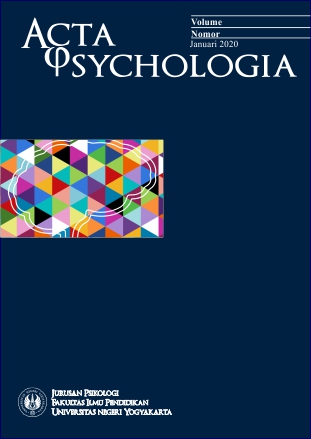Studi fenomenologis kebahagiaan guru taman kanak-kanak di Yogyakarta
DOI:
https://doi.org/10.21831/ap.v7i1.86770Keywords:
kebahagiaan, kesejahteraan subjektif, guru, taman kanak-kanak, happiness, subhective well-being, teacher, kindergartenAbstract
Penelitian ini bertujuan untuk mengungkap kebahagiaan guru taman kanak-kanak di Yogyakarta. Pendekatan kualitatif dengan analisis fenomenologi interpretatif digunakan dalam penelitian ini. Partisipan dalam penelitian ini adalah tiga guru taman kanak-kanak. Pengumpulan data dilakukan melalui wawancara mendalam. Hasil penelitian memberikan gambaran tentang kebahagiaan ketiga partisipan yang diinterpretasikan sebagai kondisi ringan, nyaman, dan didukung secara sosial. Temuan penelitian ini juga mengidentifikasi kesejahteraan subjektif yang mencakup komponen kognitif (kepuasan hidup) dan afektif (afek positif dan negatif). Penelitian ini turut mengungkap faktor-faktor yang memengaruhi kesejahteraan subjektif yaitu dukungan sosial, rasa syukur dan penghargaan, serta spiritualitas.
References
Acton, R., & Glasgow, P. (2015). Teacher Wellbeing in Neoliberal Contexts : A Review of the Literature. Australian Journal Of Teacher Education, 40(8).
Benevene P, De Stasio S & Fiorilli C. (2020) Editorial: Well-Being of School Teachers in Their Work Environment. Front. Psychol. 11:1239. DOI: https://doi.org/10.3389/fpsyg.2020.01239
Cherkowski, S., & Walker, K. (2018). Teacher wellbeing: Noticing, nurturing, and sustaining flourishing in schools. Burlington, ON: Word and Deed Press.
Creswell, John W., & Poth, CN. (2018) Qualitative Inquiry & Research Design Fourth Edition. USA: Sage Publications.
Creswell, John W. (2013). Research Design Pendekatan Kualitatif, Kuantitatif, dan Mixed. Yogyakarta : Pustaka Pelajar.
Dewi, Lharasati., & Nasywa, N. (2019). "Faktor-faktor yang Mempengaruhi Subjective Well-being." Jurnal Psikologi Terapan dan Pendidikan, vol. 1, no. 1, pp. 54-62, DOI: 10.26555/jptp.v1i1.15129.
Diener, E. (1984). Subjective well-being. Psychological Bulletin, 95(3), 542–575. DOI: https://doi.org/10.1037/0033-2909.95.3.542
Diener, E., Lucas, R. E., & Oishi, S. (2002). Sujective well-being: The science of happiness and life satisfaction. In C. R. Snyder & S. J. Lopez (Eds.), Handbook of positive psychology (pp. 463–73). Oxford University Press.
Diener, Ed. et. al. (2009). Subjective well-being: the science of happiness and life satisfaction. Psychology, personality and social psychology, clinical psychology. The oxford Handbook of Positive Psychology (2 ed.)
Portal Data Pendidikan. (2024). Jumlah Pendidik TK. https://data.dikdasmen.go.id/dataset/p/kepala-sekolah-guru-dan-tenaga-kependidikan/jumlah-pendidik-tk-2024
Drudy, S. (2008). Gender balance/gender bias: the teaching profession and the impact of feminisation. Gender and Education 20, 309–323. DOI: https://doi.org/10.1080/09540250802190156
Dollansky, T. D. (2014). The importance of the beginning teachers’ psychological contract: A pathway toward flourishing in schools. International Journal of Leadership in Education, 17, 442- 461. DOI: https://doi.org/10.1080/13603124.2013.825012
Farhah, I., Saleh, A. Y., & Safitri, S. (2021). The role of student-teacher relationship to teacher subjective well-being as moderated by teaching experience. Journal of Education and Learning (Edulearn), 15(2), 267–274.
Gyllensten, K., and Palmer, S. (2005). The role of gender in workplace stress: a critical literature review. Health Educ. J 64, 271–288. DOI: https://doi.org/10.1177/001789690506400307
Geving, A. M. (2007). Identifying the types of student and teacher behaviours associated with teacher stress. Teaching and Teacher Education, 23(5), 624–640.
Harding, S., Morris, R., Gunnella, D., Ford, T., Hollingworth, W., Tilling, K., Evans, R., Bell, S., Grey, J., Brockman, R., Campbell, R., Araya, R., Murphy, S., & Kidger, J. (2019). Is teachers’ mental health and wellbeing associated with students’ mental health and wellbeing? Journal of Affective Disorders, 242, 180–187. DOI: https://doi.org/10.1016/j.jad.2018.08.080
Karin, A. A. (2024, Oktober 25). Upah Jauh di Bawah UMR, Guru PAUD Berharap pada Pemerintahan Baru. Harian Jogja. https://jogjapolitan.harianjogja.com/read/2024/10/25/510/1192761/upah-jauh-di-bawah-umr-guru-paud-diy-berharap-pada-pemerintahan-baru
Horn, J. E. Van, Taris, T. W., Schaufeli, W. B., & Schreurs, P. J. G. (2004). The Structure Of Occupational Well Being: A Study Among Dutch Teachers. Journal of Occupational and Organizational Psychology, 77, 365–375.
Hiller, J., Schatz, K., and Drexler, H. (2017). Gender influence on health and risk behavior in primary prevention: a systematic review. J. Public Health 25, 339–349. DOI: https://doi.org/10.1080/09540121.2016.1139038
Istiqomah, N. (2021). Kesejahteraan psikologis guru honorer di SMA Negeri 13 Depok. Teraputik: Jurnal Bimbingan dan Konseling, 5(1), 48-54. DOI: https://doi.org/10.26539/teraputik.51555
Irianto & Subandi. (2015). Studi Fenomenologis Kebahagiaan Guru di Papua. Gadjah Mada Journal Of Psychology. 1(3), 140-166. DOI: https://doi.org/10.22146/gamajop.8812
Kementerian Pendidikan Dasar dan Mengengah. (2025). Pendidikan Anak Usia Dini (PAUD). https://referensi.data.kemdikbud.go.id/pustaka/paud/klasifikasi
Liu, H. (2014). Personality, leisure satisfaction, and subjective well-being of serious leisure participants. social behavior and personality. An International Journal, 42(7), 1117–1125. DOI: https://doi.org/10.2224/sbp.2014.42.7.1117
Martínez-Martí, M. L., Avia, M. D., & Hernández-Lloreda, M. J. (2010). The effects of counting blessings on subjective well-being: A gratitude intervention in a spanish sample. The Spanish Journal of Psychology, 13(02), 886–896. Doi: https://doi.org/10.1017/s1138741600002535
Mubin, F., & Masruri, A. (2020). Realitas guru honorer. DOI: https://doi.org/10.31219/osf.io/wxk32
Narea, M., Treviño, E., Caqueo-Urízar, A., Miranda C., & Gutiérrez-Rioseco, J. (2021) Understanding the relationship between preschool teachers' well-being, interaction quality and students' well-being. Child Indicators Research, 15(2), 533-551. DOI: https://doi.org/10.1007/s12187-021-09876-3
Newland, L. A., Giger, J. T., Lawler, M. J., Carr, E. R., Dykstra, E. A., & Roh, S. (2014). Subjective well-being for children in a rural community. Journal of Social Service Research, 40(5), 642–661.
Nickerson, A. B., & Nagle, R. J. (2004). The influence of parent and peer attachments on life satisfaction in middle childhood and early adolescence. Social Indicators research, 66, pp 35-60
Nurmalitasari, F. (2015). Perkembangan sosial emosi pada anak usia prasekolah. Buletin Psikologi, 23(2), 103. DOI https://doi.org/10.22146/bpsi.10567
Pan, B., Fan, S., Wang, Y., & Li, Y. (2022). The relationship between trait mindfulness and subjective wellbeing of kindergarten teachers: The sequential mediating role of emotional intelligence and self-efficacy. Frontiers in Psychology, 13, 1-13. DOI: https://doi.org/10.3389/fpsyg.2022.973103
Poima, A. S., & Ayriza, Y. (2024). Effect of Gratitude and Self Efficacy on the Subjective Well-being of Kindergarten Teachers. Journal of Educational, Health and Community Psychology, 13(2), 414–432. DOI: https://doi.org/10.12928/jehcp.v13i2.27931
Purwito, S., Nurtjahjanti, H., & Ariati, J. (2012). Hubungan Antara Subjective Well-Being dan Organizational Citizenship Behavior Pada Petugas Customer Service di Plasa Telkom Regional Division IV. Jurnal Psikologi Undip, 11(2).
Shapoval, V. (2019). Organizational injustice and emotional labor in the hospitality industry: A theoretical review. International Journal of Hospitality Management, 83, 56-64. DOI: https://doi.org/10.1016/j.ijhm.2019.04.002
Silkenbeumer, J. R., Schiller, E.-M., & Kärtner, J. (2018). Co- and self-regulation of emotions in the preschool. Early Childhood Research Quarterly, 44, setting. DOI: https://doi.org/10.1016/j.ecresq.2018.02.014
Skaalvik, E. M., & Skaalvik, S. (2011). Teacher job satisfaction and motivation to leave the teaching profession: Relations with school context, feeling of belonging, and emotional exhaustion. Teaching and Teacher Education, 27(6), 1029-1038. DOI: https://doi.org/10.1016/j.tate.2011.04.001
Smith, J.A., Flowers P., & Larkin M. (2009). Interpretative Phenomenological Analysis: Theory, Method and Research. SAGE Publications Ltd
Snyder, C. R., Lopez, S. J., Edwards, L. M., & Marques, S. C. (2020). The Oxford handbook of positive psychology. Oxford University Press.
Sugiyono. (2015). Metode Penelitian Kuantitatif, Kualitatif dan R&D. Bandung : Alfabeta.
Sugiyono. (2021). Metode Penelitian Kualitatif (Untuk penelitian yang bersifat : eksploratif, enterpretif, interaktif, dan konstruktif). Bandung : Alfabeta.
Sujiono, Yuliani Nurani. (2012). Konsep Dasar Pendidikan Anak Usia Dini. Jakarta: Indeks.
Türen, Ş., & Kuru, N. (2023). Awareness of preschool teachers on the concept of well-being. Asian Journal of Instruction, 11(Special Issue), 18-37. DOI: https://doi.org/10.47215/aji.1308170
Veenhoven, R. (2012). Happiness: Also Known as “Life Satisfaction” and “Subjective Well-Being”. In: Land, K., Michalos, A., Sirgy, M. (eds). Handbook of Social Indicators and Quality of Life Research. Springer, Dordrecht. DOI: https://doi.org/10.1007/978-94-007-2421-1_3
Weiland, A. (2021). Techer well-being : voices in the field. Teaching and Teacher Education. 99. https://doi.org/10.1016/j.tate.2020.103250
Yang, CC., Fan, CW., Chen, KM. (2018). As a Happy Kindergarten Teacher: The Mediating Effect of Happiness Between Role Stress and Turnover Intention. Asia-Pacific Edu Res 27, 431–440 DOI: https://doi.org/10.1007/s40299-018-0403-4
Zhongyan, Yang. (2015). The Analysis of Kindergarten Teacher’s Professional Happiness International Conference on Management, Computer and Education Informatization. DOI: https://doi.org/10.2991/mcei-15.2015.63
Downloads
Published
How to Cite
Issue
Section
License
Copyright (c) 2025 Angelina Ekadiana Wera Marle Marle

This work is licensed under a Creative Commons Attribution-ShareAlike 4.0 International License.
Acta Psychologia allows readers to read, download, copy, distribute, print, search, or link to its articles' full texts and allows readers to use them for any other lawful purpose. The journal allows the author(s) to hold the copyright without restrictions. Finally, the journal allows the author(s) to retain publishing rights without restrictions
- Authors are allowed to archive their submitted article in an open access repository
- Authors are allowed to archive the final published article in an open access repository with an acknowledgment of its initial publication in this journal

This work is licensed under a Creative Commons Attribution-ShareAlike 4.0 Generic License.










